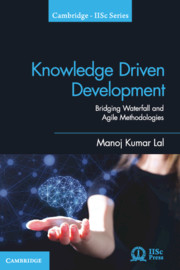Book contents
- Frontmatter
- Dedication
- Contents
- Figures
- Tables
- Foreword
- Preface
- Acknowledgements
- Overview of the Book
- 1 Knowledge Driven Development: What is the Proposition?
- 2 Project Delivery and Supporting Methodologies
- 3 Project Delivery Pain Areas and the Way Forward
- 4 Project Knowledge Model: Context and Definition
- 5 Project Knowledge Model: A Differentiator
- 6 Project Knowledge Model vs Project Documents
- 7 Extending Project Knowledge Model to Cover End-to-End Project Delivery – KDD
- 8 Extended KDD: Pre-Requirement and Post Delivery
- 9 KDD Compliance with Standards of Project Delivery
- 10 Enabling DevOps
- 11 Addressing Contemporary Concerns of Project Delivery
- 12 Helping Existing Methodologies
- 13 Technology Enablers: Tools and Automation
- 14 Suits Factory Model: Needs Cultural Change
- 15 Global Relevance of KDD: GKMF Assisting Skill Development
- 16 Lean KDD: Elimination of Requirement and Test Design?
- 17 Conclusion
- Appendix A Illustrative Non-Functional Attributes
- Appendix B Compliance of PKM with GKMF
- Appendix C Project Estimate and Business Rule/Scenario Framework
- Appendix D Inventory Relationship for Setting up of Security Questions – as per Example in Chapter 6
- Appendix E KDD: Response to Criticism
- Glossary
- References
- Index
17 - Conclusion
Published online by Cambridge University Press: 20 October 2018
- Frontmatter
- Dedication
- Contents
- Figures
- Tables
- Foreword
- Preface
- Acknowledgements
- Overview of the Book
- 1 Knowledge Driven Development: What is the Proposition?
- 2 Project Delivery and Supporting Methodologies
- 3 Project Delivery Pain Areas and the Way Forward
- 4 Project Knowledge Model: Context and Definition
- 5 Project Knowledge Model: A Differentiator
- 6 Project Knowledge Model vs Project Documents
- 7 Extending Project Knowledge Model to Cover End-to-End Project Delivery – KDD
- 8 Extended KDD: Pre-Requirement and Post Delivery
- 9 KDD Compliance with Standards of Project Delivery
- 10 Enabling DevOps
- 11 Addressing Contemporary Concerns of Project Delivery
- 12 Helping Existing Methodologies
- 13 Technology Enablers: Tools and Automation
- 14 Suits Factory Model: Needs Cultural Change
- 15 Global Relevance of KDD: GKMF Assisting Skill Development
- 16 Lean KDD: Elimination of Requirement and Test Design?
- 17 Conclusion
- Appendix A Illustrative Non-Functional Attributes
- Appendix B Compliance of PKM with GKMF
- Appendix C Project Estimate and Business Rule/Scenario Framework
- Appendix D Inventory Relationship for Setting up of Security Questions – as per Example in Chapter 6
- Appendix E KDD: Response to Criticism
- Glossary
- References
- Index
Summary
Mind, which is the warehouse of knowledge, is ever elusive. On one hand, it is so powerful that, according to Indian spiritual belief, it can visualise objects thousands of miles away in no time, and on the other hand, it is so weak that it may not even recollect what was said a minute earlier. This can be the situation of the same mind at different times. Variation in the way the mind works is dependent on the person's nature and upbringing. When many people (minds) get together to work in an IT project which is knowledge intensive, chaos is expected, by default. Even if a small portion of these minds can be synchronised to work together, project delivery can be significantly improved. KDD is an attempt to assist in synchronisation of the minds by giving a tangible structure to the intangible knowledge. It encourages people (minds) to work together on knowledge intensive areas. Through this book, an attempt is made to provide a mechanism to structure knowledge, both in IT industry (via PKM) and in general (via GKMF).
PKM
PKM, with its 18 building blocks, helps digitising project knowledge. This leads to the evolution of KDD methodology to manage end-to-end project delivery. KDD emphasises on enterprise knowledge reuse as much as possible, which differentiates it from other methodologies. The initial phases in KDD are more like Waterfall, where a certainty of requirement and solution is required. The later phases in KDD are more like Agile, where the bulk of the work is accomplished in a parallel and iterative manner, splitting the work into logical units.
Let us look at the knowledge gap in different methodologies. Figure 17.1 indicates the knowledge gap in the lifecycle of the product, from software development to its decommissioning. In Waterfall, the knowledge gap is widened, particularly at the point of handover and takeover between different teams since the mechanism for recording and storing knowledge is documents, which are costly to be reviewed and difficult to be kept updated. In Agile, the knowledge gap is relatively smaller in the software development phase, remains the same in the business area and increases in the service delivery area as there is a lack of reliable and exhaustive project knowledge to be handed over.
- Type
- Chapter
- Information
- Knowledge Driven DevelopmentBridging Waterfall and Agile Methodologies, pp. 261 - 264Publisher: Cambridge University PressPrint publication year: 2018



